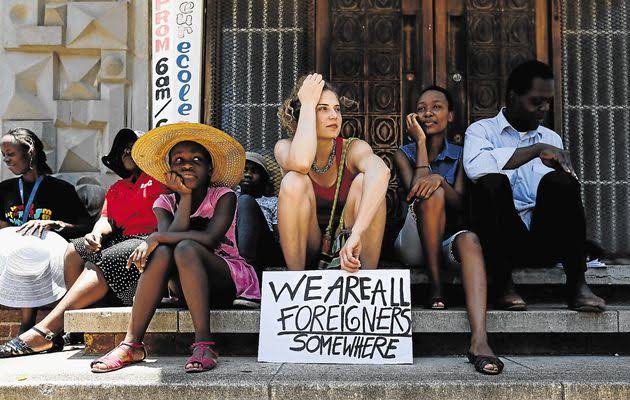What I Think About The Attack of Nigerians In South Africa

I consider myself to be a Jesus-glorifying and human-loving young…
The recent violent attacks against Nigerian citizens in South Africa (S.A.) in February 2017 may no longer be news to you, however, I seek to further explore this incident and answer some basic questions you might have in mind.
It is important to note that attacks on foreign nationals of African and non-African descent are not a new phenomenon in South Africa (S.A.). These attacks, which have been reported to be inspired by xenophobia, began before the country even gained independence in 1994, and with independence came a rise in xenophobic attacks.
But what then is “xenophobia”?
Xenophobia is the fear of a foreigner or stranger. The violent attacks in S.A. have been mostly referred to as xenophobic because they were targeted at immigrants. Some even described the attacks as “afro-phobic” (fear of foreign Africans) because the lives and properties lost were largely African.
Are these attacks only meted on Nigerians and other foreign African nationals?
Not at all, but foreign African nationals have borne the most brunt. There are about 800,000 Nigerians living in S.A., and even though there was no recorded loss of Nigerian lives in these recent attacks, many properties of Nigerian citizens were looted and destroyed in broad daylight. Although the lives and properties lost have been largely African, Pakistanis and few other Asian nationals have also recorded significant losses.
Why are these attacks still going on?
These xenophobic attacks still remain prevalent due to varied factors. A major factor being the rhetoric passed around by South African politicians, local leaders, and respected newspapers, like Goodwill Zwelithini (the Zulu king) and President Zuma’s son, against foreigners.
The attackers blamed Nigerians for rising unemployment, for putting South Africans out of business by selling at lower prices, for bribing the police to evade tax, for perpetuating crime, and were even blamed in the early 21st century for spreading AIDS in the country. The opinion of Nigerians being the top drug peddlers and sex industry enthusiasts in the country played a key influencer of these recent attacks. And although the world labels these attacks as xenophobic, the S.A. government maintains that they were mere criminal acts, rather than having been inspired by fear of foreign nationals. So whether these attacks against Nigerians and other thriving groups of foreign nationals in South Africa is ‘xenophobic’ or simply ‘criminal’ remains unclear.
Should the Nigerian state retaliate if forced to?
Officials from the Nigerian foreign mission have recently met with S.A. officials and communicated the essence of taking steps to resolve societal conventions and prevent future attacks. Hopefully, this meeting will yield peaceful fruits and long-term solutions to this challenge. However, if there be future series of similar attacks on Nigerians, I envisage the Nigerian government retaliating within diplomatic and international legal boundaries.
A great step will be for the Nigerian government to influence the African Union to place economic embargoes on S.A. This will be an effective measure, regardless of S.A.’s trade interests outside of Africa. In ensuring legal retaliations, however, the Nigerian government will have to map out strategic measures to deal with the challenge of preventing possible violent public attacks on S.A. nationals and firms resident in Nigeria.
Nigerians resident in Nigeria will also have a very significant role to play in influencing the S.A. government further. This can play out in a nationwide boycott of South African products and services in Nigeria, and it can only be a collaborative effort to successfully pass the message across. This feat can easily be achieved with the help of social media.
How can future xenophobic attacks be curtailed?
In response to the violent attacks on Nigerians in South Africa, the S.A. government and South African multinationals, like MTN, released statements condemning the attacks. Though a good step in the right direction, more statements condemning the nature of such attacks need to be made by local community leaders, politicians, and music artists who have great influences on the young populace in South Africa.
Furthermore, it is evident that there are cultural and ethnic/nationalistic factors underlying these incidents, stemming from the long lasting effects of colonialism and post-colonialism. Hence, this issue of violence can be largely halted if ethnicity is kept in mind.
It is also important to note that these xenophobic attacks have a liking to the post-independence ethnic crisis and wars that were fought within many African countries. For example, the Nigerian civil war was a post-independence phenomenon between South-East Nigeria (formerly Biafra) and the rest of Nigeria. Hence, it could be safe to regard these largely “afro-phobic” attacks as post-independence evils of colonization.
Therefore, and in addition to preventive measures, the S.A. government should endeavour to make palliative funds available to Nigerians and all other foreign nationals who have lost family and/or properties as a result of these violent loots.
I have endeavored to make clear some uncertainties regarding this event, and the article contains steps I think should be taken in providing a lasting solution to the violent attacks suffered by foreign nationals in South Africa. Please feel free to leave your thoughts on how this issue can be resolved, and any further questions.
Image Credit: VenturesAfrica
What's Your Reaction?
I consider myself to be a Jesus-glorifying and human-loving young Nigerian. I'm creative, performing arts oriented, idealistic, and courageous. These have aided my writing, as well as "plagued" me with so many ideas, lol. I'm also an aspiring humanitarian expert, public policy influencer, and businessman, and I hope to establish various frontiers for the advancement of "the people".

